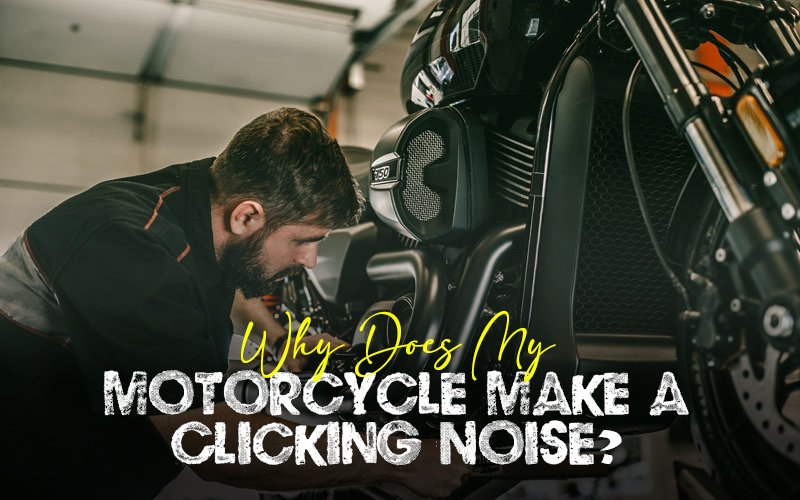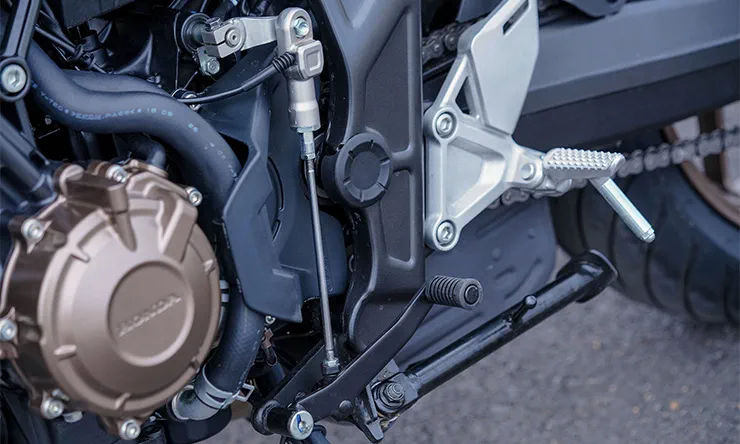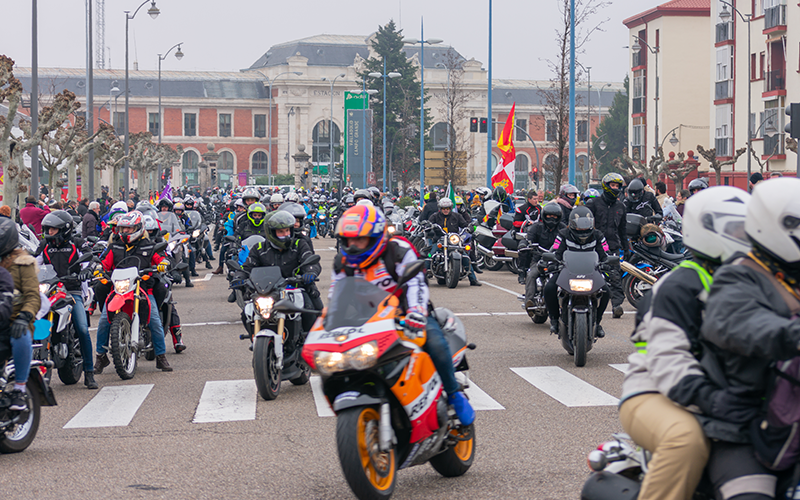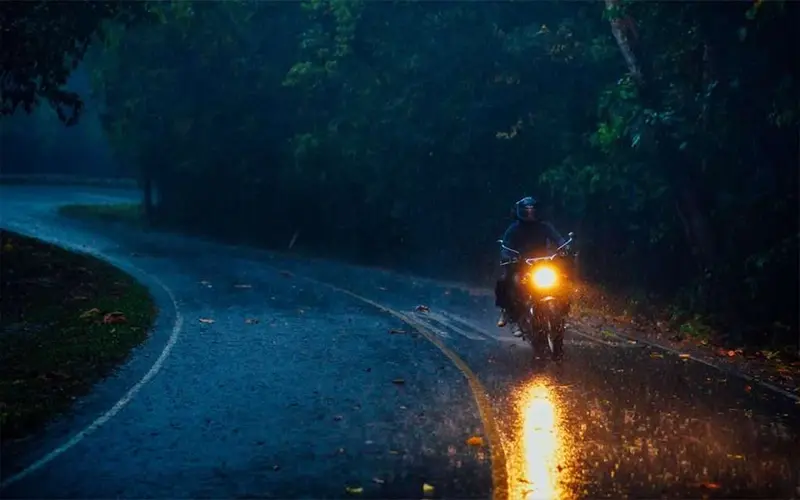You’re riding down the road, the wind in your face, the sun at your back—and then you hear it: a faint but unmistakable clicking noise coming from your motorcycle. At first, you might ignore it, thinking it’s just a one-off sound. But soon, the clicking becomes more persistent, perhaps even louder, every time you ride. What is this annoying sound, and more importantly, should you be worried?
In this blog, we’ll dive deep into the mystery behind your motorcycle’s clicking noise, identifying the potential causes and what steps you can take to fix it before a minor sound becomes a major problem.
What’s That Sound? Why Clicking Noises Shouldn’t Be Ignored

Motorcycles are complex machines, and every sound they produce has a reason. Some sounds are routine, such as the smooth purr of your engine or the occasional pop from the exhaust. But a persistent clicking sound, especially one that you’ve never heard before, is often a signal that something is wrong.
While clicking noises can sometimes indicate a minor issue, they can also point to more serious mechanical problems that, if left unaddressed, could lead to costly repairs or even compromise your safety.
Common Causes of Clicking Noises in Motorcycles

Let’s take a closer look at some of the most common causes of clicking noises in motorcycles, and what each might mean for the health of your bike.
1. Loose or Worn Chain
One of the most common causes of clicking noises, particularly when accelerating or decelerating, is a loose or worn-out chain. If the chain is too slack, it may slap against parts of the bike, producing a repetitive clicking or clacking noise. On the other hand, a worn chain can have stiff links that don’t move as smoothly as they should, also causing clicking.
Solution: Regularly inspect your chain for proper tension and lubrication. A well-maintained chain should have about 1-1.5 inches of play. If the chain is too loose, tighten it according to your bike’s manual. If it’s worn or the links are stiff, it’s time for a replacement.
2. Valve Clearance Issues
Your motorcycle’s engine relies on a precise interaction between the valves and the camshaft. If the valve clearance is off (either too loose or too tight), it can lead to a clicking or ticking noise, especially noticeable at idle or low speeds. This happens because the valves aren’t closing properly, causing the metal components to click against each other.
Solution: Valve adjustments can be a bit tricky and usually require a professional mechanic. It involves checking and adjusting the space between the valve and the camshaft (also known as valve lash). If you suspect a valve issue, it’s best to take your bike to a service center for a proper inspection and adjustment.
3. Low Engine Oil
Another potential cause for clicking noises is low or dirty engine oil. Engine oil is responsible for lubricating all the moving parts inside your engine. If the oil level is low or the oil has become dirty and lost its effectiveness, metal parts can start rubbing against each other, producing a clicking or tapping sound.
Solution: Regularly check your engine oil levels and quality. If your oil is low, top it off to the appropriate level. If it’s dirty, it’s time for an oil change. Riding with low or old oil can cause severe engine damage, so don’t put off this simple maintenance task.
4. Loose or Worn Brake Components
If the clicking noise occurs when you apply the brakes, it could be due to loose or worn brake components. Worn brake pads, loose calipers, or even loose bolts in the braking system can all create clicking sounds when you engage the brakes.
Solution: Inspect your brakes regularly. Ensure that the brake pads aren’t overly worn and that the calipers and bolts are all secure. If any components are loose or damaged, replace them promptly to ensure your brakes function properly and safely.
5. Faulty Wheel Bearings
A clicking sound that seems to come from the wheels, particularly when turning or leaning into corners, could be a sign of worn or damaged wheel bearings. These bearings allow your wheels to spin freely and smoothly, but when they wear out, they can create friction, leading to clicking or grinding noises.
Solution: If you suspect faulty wheel bearings, it’s essential to have them checked and replaced by a professional. Riding with bad bearings can be dangerous, as it can lead to wheel failure or loss of control.
6. Exhaust System Leaks
A leak in the exhaust system can sometimes manifest as a clicking or tapping sound, especially when you rev the engine. Exhaust leaks often occur where the exhaust pipes connect to the engine, and the sound can vary from a soft ticking to a louder, more aggressive noise.
Solution: If you think your exhaust is leaking, inspect the connections for any signs of soot or damage. Tightening the bolts or replacing damaged gaskets can often resolve the issue. However, if the exhaust pipe itself is damaged, you may need to replace it.
7. Loose or Damaged Fairings and Bodywork
Sometimes the source of a clicking noise isn’t internal at all—it’s loose bodywork. Fairings, fenders, or other parts of your bike’s body can become loose over time due to vibration. When this happens, these parts can click against each other or the frame as you ride.
Solution: Regularly check all bolts, screws, and fasteners on your bike to ensure everything is securely in place. Tighten or replace any loose or missing fasteners. Keeping your bike’s bodywork tight not only prevents annoying noises but also helps maintain the structural integrity of the bike.
From Clicking to Confidence
Let’s take a break from the technical stuff for a moment and talk about James, a fellow rider who experienced the dreaded clicking noise. James had just bought a used motorcycle, and everything seemed perfect—until one day, out of nowhere, a clicking noise started while he was riding to work. At first, it was faint, almost like the ticking of a clock. But over time, it became louder, and James found himself more focused on the noise than the ride.
After trying to figure it out on his own, James took his bike to a mechanic, worried that it would cost him a fortune to fix. To his surprise, the problem was a simple one: his chain had become loose, and a couple of links were stiff. After a quick adjustment and some lubrication, the clicking was gone, and James was back to enjoying his rides—this time with a newfound confidence in knowing how to listen to his bike.
How to Diagnose and Address the Clicking Noise

If you’re hearing a clicking noise while riding, it’s important not to panic. Diagnosing the issue step by step will help you narrow down the cause and find the solution. Here’s a guide to help you troubleshoot the issue:
Step 1: Check the Chain
Start by inspecting your chain. Is it loose? Are there any stiff links? If so, tighten or replace the chain as needed. A well-maintained chain is crucial for a smooth ride.
Step 2: Inspect the Brakes
Next, check your brake system. Look for worn pads or loose components. Tighten any loose bolts and replace worn parts to eliminate any clicking from your brakes.
Step 3: Examine the Engine Oil
Check your engine oil levels and quality. If the oil is low or dirty, it’s time for a top-up or an oil change. Proper lubrication is essential for a healthy engine.
Step 4: Check for Exhaust Leaks
Look for any signs of exhaust leaks, such as soot around the connections. Tighten or replace gaskets and bolts as needed to ensure a sealed exhaust system.
Step 5: Listen While Riding
Take note of when the clicking happens—during braking, acceleration, or while turning. This can give you clues about where the problem lies, whether it’s the wheels, brakes, or engine.
Step 6: Consult a Professional
If you’ve gone through these steps and still can’t find the source of the noise, it’s time to consult a professional mechanic. They can conduct a more thorough inspection and pinpoint the problem.
Final Thoughts: Keep Your Ears Open
Motorcycle maintenance is all about listening—both to your bike and to your instincts. A clicking noise may seem small at first, but it’s often a sign that something needs attention. By keeping up with regular inspections, addressing issues promptly, and listening to what your bike is telling you, you can prevent small problems from turning into bigger, more costly ones.
Remember, your motorcycle is a finely tuned machine, and every sound it makes has a purpose. Treat it with care, and it will reward you with many smooth and enjoyable rides.
Stay safe, and keep those wheels turning!











